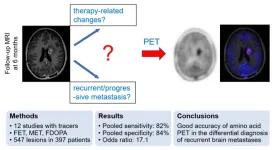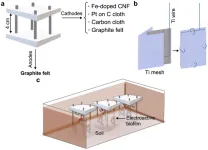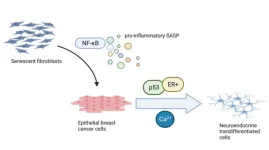(Press-News.org) Anabolic steroids not only can cause serious side effects during use, such as heart failure and depression, but can continue being harmful years after stopping, according to two studies presented at the 25th European Congress of Endocrinology in Istanbul. These studies, supported by the Novo Nordisk Foundation, were carried out by researchers from the Copenhagen University Hospital Rigshospitalet who investigated the impact of anabolic steroids in former users.
Anabolic steroids – synthetic hormones that mimic the naturally-occurring sex hormone testosterone – are used to increase muscle mass and boost athletic performance. These performance-enhancing drugs have harmful side effects, for instance in men these include breast growth, hair loss, lower testosterone levels, erectile dysfunction, and an increased risk of heart disease, stroke, and liver or kidney failure. However, not much is known about the effects years after stopping their use.
In one study, the researchers examined 64 healthy men, between the ages of 18 and 50, who did recreational strength training in Denmark. Of these men, 28 were using anabolic steroids, 22 were former steroid users, and 14 had never used these steroids. The researchers assessed how much blood flowed to their heart muscle when resting and exercising, using a Positron Emission Tomography-Computed Tomography (PET-CT) scan with the radioactive tracer Rubidium-82, and found both former and current users had a poor blood flow to the heart.
The findings indicate that former steroid users are more likely to develop heart disease when compared to those who have never used them. “Previous studies have shown that the heart function almost normalises after anabolic steroids are discontinued, but our study suggests that former anabolic steroid users are at an increased risk of heart disease years after stopping as cardiac microcirculation – the blood flow through the smallest vessels in the circulatory system – seems persistently impaired,” said lead author Dr Yeliz Bulut. “The previous use of anabolic steroids could be a new risk factor for developing cardiovascular disease.”
In another study, Dr Bulut and colleagues collected questionnaires and blood samples to measure testosterone levels from three groups of men, aged 18-50 years: 89 current anabolic steroid users, 61 former steroid users, and 30 men who had never used steroids before. They found that former users of anabolic steroids report a worse quality of life on their physical and mental health, such as fatigue, social functioning and emotional well-being, despite stopping years earlier. Additionally, the same group had lower testosterone levels compared to those who had never used steroids.
Previous studies have shown that men experience withdrawal symptoms, such as depression and low motivation, and have lower levels of testosterone, immediately after they stop using steroids. “Our study adds to the growing body of literature that an impaired quality of life in previous anabolic steroid users seems to persist years following cessation and could be caused by both withdrawal and/or hypogonadal symptoms due to a sudden drop in testosterone levels in the blood,” said Dr Bulut. “Sadly, a reported worse quality of life could be a reason for former users to start reusing these steroids again.”
Both studies included a small number of anabolic steroid users, former users and non-users. Dr Bulut and her team now plan to recruit more men to the studies to assess both of these links with former steroid abuse on a larger scale. “Our initial findings show that previous anabolic steroid users are likely to develop heart disease and have a decreased quality of life but we need to confirm these results with larger studies and investigate how the risk changes in relation to the years of usage and/ or cessation,” said Dr Bulut. “Steroid side effects among former users seem to persist for a much longer period than we have known until now. We hope our results on these long-term health risks will prevent men from using anabolic androgenic-steroids.”
--------ENDS-------
Notes for Editors:
For press enquiries, or to arrange an interview with the study authors, please contact the ECE 2023 press office:
Joanna Williams
Communications Executive
Mob: +44 (0) 7876 824 027
Email: joanna.williams@endocrinology.org
The study “PREVIOUS USE OF ANABOLIC ANDROGENIC STEROIDS IS ASSOCIATED WITH PERSISTENT IMPAIRED MYOCARDIAL MICROCIRCULATION” will be presented at on Tuesday 16 May 2023 at the European Congress of Endocrinology at the Halic Congress Center in Istanbul, Turkey. See the full scientific programme here.
The poster “DECREASED QUALITY OF LIFE IN PREVIOUS USERS OF ANABOLIC ANDROGENIC STEROIDS YEARS AFTER CESSATION” will be presented on Saturday 13 May 2023 at the European Congress of Endocrinology at the Halic Congress Center in Istanbul, Turkey.
The European Society of Endocrinology (ESE) provides a platform to develop and share leading research and best knowledge in endocrine science and medicine. By uniting and representing every part of the endocrine community, we are best placed to improve the lives of patients. With over 5,000 individual members and through the 51 National Societies involved with the ESE Council of Affiliated Societies (ECAS), ESE represents a community of over 20,000 European endocrinologists. We inform policy makers on health decisions at the highest level through advocacy efforts across Europe.
END
Steroids linked to long-lasting heart disease risk and worse quality of life
2023-05-13
ELSE PRESS RELEASES FROM THIS DATE:
Low levels of vitamin D linked to long COVID
2023-05-13
Long COVID risk has been found to increase with low levels of vitamin D, according to research presented at the 25th European Congress of Endocrinology in Istanbul. The findings suggest that individuals should have their vitamin D levels checked after COVID-19.
Also known as post COVID-19 syndrome, long COVID is a new condition in which the effects of COVID-19 last for more than 12 weeks after contracting the initial infection. Studies have shown that it affects 50-70% of patients previously hospitalised for COVID-19, yet very little is known about the condition. One risk factor for worse outcomes for hospitalised COVID-19 patients, such as intubation and mechanical ventilation ...
Accelerated delivery of transcranial magnetic stimulation is safe and effective
2023-05-12
May 12, 2023 — Accelerated schedules for repetitive transcranial magnetic stimulation (rTMS) can be offered to patients experiencing treatment-resistant major depressive disorder (MDD), a group of clinician–researchers and neuroscientists have concluded. The group cautions that such treatment should be proposed only after detailed discussion with patients about acceleration being an alternate form of rTMS scheduling, with documentation of informed consent.
The recommendations are published in a ...
Amino acid PET successfully differentiates recurrent brain metastases, reducing invasive procedures and overtreatment
2023-05-12
Reston, VA—A newly published meta-analysis indicates that amino acid PET can accurately differentiate recurrent or progressive brain metastases from treatment-related changes. A specificity of 84 percent suggests that it may reduce the number of invasive procedures and overtreatment in patients who in fact experience treatment-related changes. This research was published in the May issue of The Journal of Nuclear Medicine.
Brain metastases occur in 20 to 40 percent of all cancer patients and are most likely ...
Is it too late to change your mind? Study reveals ‘developmental window’ for thinking styles
2023-05-12
Key takeaways
Researchers studied the way different generations in Romania determined the truth of information following the country’s transition from authoritarianism to democracy.
Those who were born and raised after the transition were more likely than older cohorts to compare and evaluate different perspectives before deciding who is right.
The factors associated with the youngest generation’s style of thinking were greater exposure to formal education and social media.
While people change and learn throughout life, experts recognize ...
TVT 2023 late-breaking science announced
2023-05-12
NEW YORK – May 12, 2023 – The Cardiovascular Research Foundation (CRF) announced that TVT: The Structural Heart Summit will feature 15 Late-Breaking Clinical Science studies. An annual meeting featuring cutting-edge research and techniques for structural heart interventions, TVT will take place June 7-10, 2023, at the Phoenix Convention Center – West in Phoenix, Arizona.
TVT has become the epicenter of innovation and collaboration in the structural heart arena over its 16-year history. The meeting brings together world-renowned experts and master operators to help translate novel discoveries into practical therapies for patients with valvular heart disease.
TVT’s ...
UArizona Engineering alum returns to lead School of Mining and Mineral Resources
2023-05-12
Misael Cabrera has been selected through a nationwide search as the inaugural director of the School of Mining and Mineral Resources. The school was created in 2021 and is jointly housed in the College of Engineering and the College of Science, with strong partnerships to additional colleges and centers.
“Our role is to deliver talent and technology through research, but also to change the top-of-mind association with mining. We can create real solutions that both industry and our planet need,” said Cabrera.
Cabrera, who began the position in April, most ...
Researchers track antimicrobial resistance in E. coli isolated from swine
2023-05-12
The spread of drug-resistant microbes has become a global health concern that threatens our ability to treat infections. The widespread use of antimicrobials in livestock, such as swine farms, exacerbates this problem. Therefore, we need surveillance systems to monitor these microbes to support the public health authorities. To this end, researchers have tracked the antimicrobial resistance of Escherichia coli isolated from swine.
Antimicrobials are essential for preventing and treating infections in humans and animals. According to the US Food and Drug Administration, 70% of all antibiotic ...
Carbon-based cathodes impact biofilm composition and performance in soil microbial fuel cells
2023-05-12
In the context of increasing energy demands and environmental concerns, renewable energy solutions are crucial for achieving net-zero emissions by 2050. Microbial electrochemical technologies, such as SMFCs, are cost-effective and environmentally friendly, making them an attractive option for green energy systems. SMFCs utilize endogenous microorganisms present in soil to convert organic matter into electricity, offering a sustainable energy source and a self-powered in situ bioremediation strategy for contaminated soils.
Cathode materials play a significant role in the performance of microbial fuel cells. In this study, researchers compared the performance ...
Healthy teeth thanks to the "washing machine effect”
2023-05-12
Ruminants like cows have developed an unusual way of digesting their food: they ingest plants, give them a rough chewing and then swallow the half-chewed mash before regurgitating it repeatedly and continuing to chew. This has clear advantages, as a research team including the University of Göttingen has shown: the regurgitated mushy food contains much less hard grit, sand and dust than the food that they first ingested. This protects the teeth from being ground down during the chewing process. This ...
The senescence-associated secretory phenotype induces neuroendocrine transdifferentiation
2023-05-12
“We recently unveiled a new interesting role for SASP: its ability to induce neuroendocrine transdifferentiation (NED) in breast cancer epithelial cells [3].”
BUFFALO, NY- May 12, 2023 – A new editorial paper was published in Aging (listed by MEDLINE/PubMed as "Aging (Albany NY)" and "Aging-US" by Web of Science) Volume 15, Issue 8, entitled, “The senescence-associated secretory phenotype induces neuroendocrine transdifferentiation.”
In this editorial, researchers Anda Huna, Nadine Martin and David Bernard from the Université de Lyon discuss the senescence-associated secretory phenotype (SASP). SASP, ...





